 Contrary to GOP gaslighting, the source of the Lone Star State's disastrous power outage cannot be found in the yet-to-be adopted Green New Deal or in a failure of wind turbines, which account for only a small percentage of the energy supply in Texas. As Naomi Klein observed, when she recently appeared on Democracy Now, "Texas is about as far from a Green New Deal as you can possibly get."
Contrary to GOP gaslighting, the source of the Lone Star State's disastrous power outage cannot be found in the yet-to-be adopted Green New Deal or in a failure of wind turbines, which account for only a small percentage of the energy supply in Texas. As Naomi Klein observed, when she recently appeared on Democracy Now, "Texas is about as far from a Green New Deal as you can possibly get."
The true source of the Texas energy failure, per Klein, lies in the Enron-like deregulation of the Texas energy grid.
As has occurred in other privatized and profit-driven sectors of the economy, like healthcare, where profit-driven "efficiencies" resulted in an insufficient hospital bed capacity in the midst of the deadly COVID-19 pandemic, Texas failed to deploy "built-in redundancies," she explained. While uniquely refusing to be a part of either of the two national energy grids, the state's 1999 deregulation scheme also failed to account for the impact of extreme weather on its own, isolated statewide power grid.
The failure of some wind turbines in TX, for example, was entirely avoidable. Wind turbines, according to a Canadian government study, can include "cold weather packages" that allow them to function in temperatures as low as -30C (-22F). In fact, the U.S. Research Station at McMurdo Sound in Antarctica operates on wind turbines that produce enough electricity to power 100 American homes.
Thermal energy production by natural gas, coal and nuclear, accounts for about 80% of energy production in the state. Those systems, which were also not winterized, brought the most disruption to the state's energy supply.
But the problem isn't limited to the profit-driven evasion of "built-in redundancies". Those Texans who didn't lose power became victims of what Tyson Slocum of Public Citizen's Energy Program described as "predatory utility pricing" in which the cost per megawatt hour (MWh) suddenly spiked from $20/MWh to $9,000/MWh. Roland Burns, CFO of Comstock Resources, Inc., a natural gas supply company owned by Dallas Cowboys' billionaire owner Jerry Jones, boasted that the Texas power disaster was "like hitting the jackpot."
Sound familiar? It should...
The 2005 film, Enron: The Smartest Guys in the Room, documents managers at the now defunct Texas-based energy trader deliberately shutting down between 30 and 50% of California's electrical grid in 2001. As they gamed the system, Enron traders burst out in laughter about a hypothetical victim of the scam, "Grandma Millie", while the company's profits shot through the roof.
A White Paper [PDF] issued in April 2004 by then California Attorney General Bill Lockyer, details how, after having been taken in by the false promise that market competition between power companies would result in lower prices, the Golden State legislature made the disastrous decision, in 1999, to deregulate its energy market. This led to a deliberately manufactured energy crisis that resulted in multiple shut downs of the energy supply in order to maximize profits. One Federal Energy Regulatory Commission (FERC) judge, Lockyer noted, "found that a major natural gas company withheld capacity on its pipeline to drive up prices". The state AG reported that in just one year following deregulation, CA's wholesale energy costs skyrocketed some 277%, from $7.4 billion in 1999 to an astounding $27.1 billion in 2000. By 2001, the average retail cost of electricity for Californians was $313/MWh, as compared to $39/MWh in PA, NJ and MD that same year.
The California energy scam was disturbing. But the state's energy customers were a bit more fortunate than Texans in the recent crisis. Where California's rolling blackouts in 2000 and 2001 may have led to the death of one man who was on dialysis, the power outages in Texas have resulted in the deaths of at least 86 people to date, according to the Austin American Statesman.
Both events support the calls for full public ownership of the energy grid as an essential component of a Green New Deal.
 Ernest A. Canning is a retired attorney, author, and Vietnam Veteran (4th Infantry, Central Highlands 1968). He previously served as a Senior Advisor to Veterans For Bernie. Canning has been a member of the California state bar since 1977. In addition to a juris doctor, he has received both undergraduate and graduate degrees in political science. Follow him on twitter: @cann4ing.
Ernest A. Canning is a retired attorney, author, and Vietnam Veteran (4th Infantry, Central Highlands 1968). He previously served as a Senior Advisor to Veterans For Bernie. Canning has been a member of the California state bar since 1977. In addition to a juris doctor, he has received both undergraduate and graduate degrees in political science. Follow him on twitter: @cann4ing.


 Trump Admin's Endless Waste, Fraud, Abuse on Voting, at DOJ, by DOGE: 'BradCast' 1/20/26
Trump Admin's Endless Waste, Fraud, Abuse on Voting, at DOJ, by DOGE: 'BradCast' 1/20/26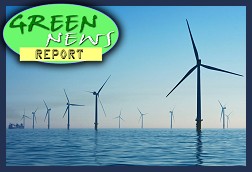 'Green News Report' 1/20/26
'Green News Report' 1/20/26
 Sunday 'Domestic Terrorist' Toons
Sunday 'Domestic Terrorist' Toons 'A Cornered Rat is a Dangerous Rat': Trump Terrorizes Minn., Menaces NATO, World: 'BradCast' 1/15/26
'A Cornered Rat is a Dangerous Rat': Trump Terrorizes Minn., Menaces NATO, World: 'BradCast' 1/15/26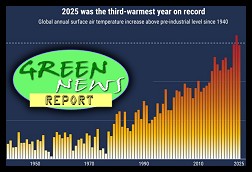 'Green News Report' 1/15/26
'Green News Report' 1/15/26 'This Isn't Close to Over': Mad King Trump in Venezuela (and Beyond): 'BradCast' 1/14
'This Isn't Close to Over': Mad King Trump in Venezuela (and Beyond): 'BradCast' 1/14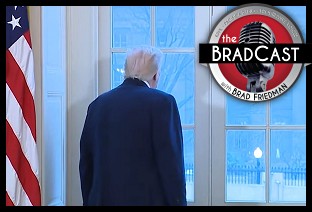 Things Getting Weirder as Trump Keeps Losing: 'BradCast' 1/13/26
Things Getting Weirder as Trump Keeps Losing: 'BradCast' 1/13/26 'Green News Report' 1/13/26
'Green News Report' 1/13/26 After ICE Murder in MN, Local Cops Disown Fed Policing Practices: 'BradCast' 1/12/26
After ICE Murder in MN, Local Cops Disown Fed Policing Practices: 'BradCast' 1/12/26 Sunday 'Ice Age' Toons
Sunday 'Ice Age' Toons 'Green News Report' 1/8/26
'Green News Report' 1/8/26 Trump to Congress, Climate, U.N., Rule of Law: DROP DEAD - 'BradCast' 1/8/26
Trump to Congress, Climate, U.N., Rule of Law: DROP DEAD - 'BradCast' 1/8/26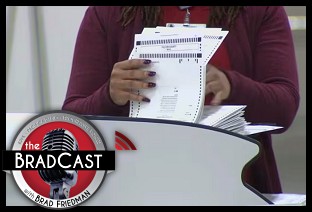 'Nonsense': Trumpers Claim 315k Fraudulent GA Votes in 2020: 'BradCast' 1/7/26
'Nonsense': Trumpers Claim 315k Fraudulent GA Votes in 2020: 'BradCast' 1/7/26 Jack Smith Testimony on Trump J6 Crimes, DOJ Weaponization: 'BradCast' 1/6/26
Jack Smith Testimony on Trump J6 Crimes, DOJ Weaponization: 'BradCast' 1/6/26 Trump War on Venez. is About Ego, Power, 'Alien Enemies Act': 'BradCast' 1/5/26
Trump War on Venez. is About Ego, Power, 'Alien Enemies Act': 'BradCast' 1/5/26 Have a Holly Jolly Somehow
Have a Holly Jolly Somehow Old Man Shouts at People from WH for 20 Minutes: 'BradCast' 12/18/25
Old Man Shouts at People from WH for 20 Minutes: 'BradCast' 12/18/25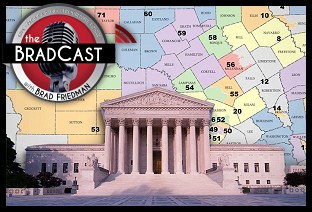 SCOTUS' How-To on Gerrymandering on 'Eve' of Election Year: BradCast' 12/17/25
SCOTUS' How-To on Gerrymandering on 'Eve' of Election Year: BradCast' 12/17/25 Bricks in the Wall: 'BradCast' 12/16/25
Bricks in the Wall: 'BradCast' 12/16/25
 VA GOP VOTER REG FRAUDSTER OFF HOOK
VA GOP VOTER REG FRAUDSTER OFF HOOK Criminal GOP Voter Registration Fraud Probe Expanding in VA
Criminal GOP Voter Registration Fraud Probe Expanding in VA DOJ PROBE SOUGHT AFTER VA ARREST
DOJ PROBE SOUGHT AFTER VA ARREST Arrest in VA: GOP Voter Reg Scandal Widens
Arrest in VA: GOP Voter Reg Scandal Widens ALL TOGETHER: ROVE, SPROUL, KOCHS, RNC
ALL TOGETHER: ROVE, SPROUL, KOCHS, RNC LATimes: RNC's 'Fired' Sproul Working for Repubs in 'as Many as 30 States'
LATimes: RNC's 'Fired' Sproul Working for Repubs in 'as Many as 30 States' 'Fired' Sproul Group 'Cloned', Still Working for Republicans in At Least 10 States
'Fired' Sproul Group 'Cloned', Still Working for Republicans in At Least 10 States FINALLY: FOX ON GOP REG FRAUD SCANDAL
FINALLY: FOX ON GOP REG FRAUD SCANDAL COLORADO FOLLOWS FLORIDA WITH GOP CRIMINAL INVESTIGATION
COLORADO FOLLOWS FLORIDA WITH GOP CRIMINAL INVESTIGATION CRIMINAL PROBE LAUNCHED INTO GOP VOTER REGISTRATION FRAUD SCANDAL IN FL
CRIMINAL PROBE LAUNCHED INTO GOP VOTER REGISTRATION FRAUD SCANDAL IN FL Brad Breaks PA Photo ID & GOP Registration Fraud Scandal News on Hartmann TV
Brad Breaks PA Photo ID & GOP Registration Fraud Scandal News on Hartmann TV  CAUGHT ON TAPE: COORDINATED NATIONWIDE GOP VOTER REG SCAM
CAUGHT ON TAPE: COORDINATED NATIONWIDE GOP VOTER REG SCAM CRIMINAL ELECTION FRAUD COMPLAINT FILED AGAINST GOP 'FRAUD' FIRM
CRIMINAL ELECTION FRAUD COMPLAINT FILED AGAINST GOP 'FRAUD' FIRM RICK SCOTT GETS ROLLED IN GOP REGISTRATION FRAUD SCANDAL
RICK SCOTT GETS ROLLED IN GOP REGISTRATION FRAUD SCANDAL VIDEO: Brad Breaks GOP Reg Fraud Scandal on Hartmann TV
VIDEO: Brad Breaks GOP Reg Fraud Scandal on Hartmann TV RNC FIRES NATIONAL VOTER REGISTRATION FIRM FOR FRAUD
RNC FIRES NATIONAL VOTER REGISTRATION FIRM FOR FRAUD EXCLUSIVE: Intvw w/ FL Official Who First Discovered GOP Reg Fraud
EXCLUSIVE: Intvw w/ FL Official Who First Discovered GOP Reg Fraud GOP REGISTRATION FRAUD FOUND IN FL
GOP REGISTRATION FRAUD FOUND IN FL

































